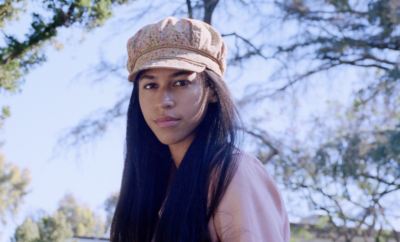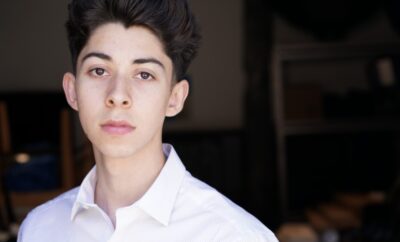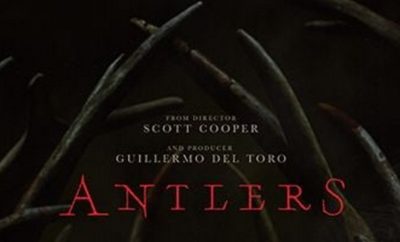Interviews
Annet Mahendru – The Americans
Q) Obviously, it was a big blow to see Nina get sent back to Russia at the end of last season. What do you think was going on in her head, other than betrayal from Stan? Do you think that that there was any relief that it was finally over, that she didn’t have to play both sides anymore?
A) Yes. She is definitely going to face her own fate, and she’s decided to do it. She could have been exfiltrated. We had the car ready for her and Stan and already had the money for her and told her to run. I think she’s just going to face whatever it is.
Q) Obviously, in isolation, Nina is playing a bit of a different role this season. Can you talk a little bit about what’s in store for Nina in the coming episodes?
A) A lot of isolation. It’s finding your way to survive. She’s still tough. She’s still Nina but without all the ways she usually has to survive. It’s a really, really scary time, and you’re really just facing yourself. That’s it.
Q) I’m wondering; when you’re not working do you like to watch TV and if so, what do you like to watch?
A) I do. I’ve been watching The Comeback, and I watched Married; so, a lot of comedy recently.
Q) The scripts are so sharply written. Do they still surprise you? Do the twists and turns still surprise you? And what was your initial reaction to getting the script for the finale of last season?
A) They always surprise me. It’s nice that way. I always know that there’s something crazy happening to Nina. There always is, but I never know what. The world is always moving, and it’s such a thrill for me as an artist. When I got the finale, I, too, was hopeful. There was still—Stan was in the car, and she wasn’t alone yet. She wasn’t on the plane yet. There was a lot of possibility. Then you wait for the next one and then you find out that you’re in prison.
Q) I read you were born in Afghanistan, that your father is Indian, and your Mother is Russian, you speak six languages, so you have the profile to be a natural spy. I want you to tell me a little bit about your upbringing. How was your childhood and then why did you travel to live to the US?
A) Because I was a spy. No, I think that’s how I got the job, though, because they asked me the same questions in my audition. I think I felt, for a second, maybe that’s enough. I don’t have to do my scene anymore. Because they were like, wait are you a spy, is your dad a spy? Why did I come here? I came here to learn English. I essentially grew up here, so it was a surprise for me to do a Russian part. I hadn’t been—I’m an American, I guess, in disguise.
Q) I know that you and Keri don’t really share any screen time but when I’m watching the show I see a lot of similarities between Nina and Elizabeth. I feel like you’re both very good at your jobs, sometimes even more so than someone like Stan or someone like Philip. I was just wondering; do you see any similarities between Nina and Elizabeth?
A) Yes, that’s a great point. I do. I do in the fact that Nina chooses to go back, not chooses, but she doesn’t run away. She doesn’t take Stan up on his plans because she was brought up in the Soviet Union. She’s a child of that belief system. The thing Stan is offering her is an American way; to have a choice, to get what you want, to succeed and then to be important. Her ways are you’re doing something for the greater good, for the people. She’s essentially jeopardized her people, and now she’s facing the consequences and she’s going for it. So that says a lot about, I guess, who she is. Elizabeth is also very true to her upbringing.
Q) I was wondering if you could tell us anything about what we’ll see happen with Nina and her cellmate in the coming episodes?
A) Evi comes, and she’s a horrible intrusion to Nina’s life in prison now to her little cell of privacy. And it’s not—she greets her with suspicion and hate because in her experience connecting with people has gotten her in trouble. Now she has nothing and who knows why this woman is there now and why she’s been joined with Nina. There’s just no trust at this point and no interest either. You’d think it’d be good to have someone to share with, but, again, what can you share. You can’t in the world that she lives in.
Q) What I was interested in, you mentioned that there’s a lot of isolation for Nina this season. I’m kind of wondering if we’re going to see her, basically where her loyalties lie. She’s basically kind of been betrayed on both sides and played both sides. Will you get to explore that at all this season; the idea of loyalty and the cause that she was originally brought into this whole world for?
A) Yes. She’s been there for four months now in isolation. One day sometimes is a long time. She’s been staring at those cracks on the wall and they kind of branch off and it’s kind of like her life. Had she done this, she would have been somewhere else. Had she never met Stan or actually never confessed where would her life have taken her? She went from an accomplished KGB officer who’s done so much in her first tour, second in charge at the [indiscernible] to a criminal. She’s thinking about Stan, and she’s thinking about Oleg and about having nothing at the end and possibly facing 15 years at a prison camp. Just mulling over all that and going crazy.
Q) I wanted to ask about the motivations of Nina through the seasons. For Season 1, it was purely about survival, and then in Season 2 she felt that she could play both sides. You didn’t know what her ultimate goal would be because she could easily go to either side. What’s her motivation this season? Is it survival? Is it trying to find a way out or maybe trying to find a loophole to escape?
A) I feel like she’s been doing everything that she’s been told to do. She’s been a really good student, and that has gotten her places. And now she’s, I think, really discovering who she really is and, I think, what her beliefs really are and what, maybe, what she wants. I think maybe we’ll really meet her now, this season.
Q) Does playing this part does have any special meaning for you. I don’t know if it reminds you of your childhood in Russia or it reminds you maybe of your mother or anything, something apart from the thrill of playing a spy? I don’t know if it has any special meaning for you.
A) It has a lot of special meanings for me. I went to school for international relations, and I wanted to use my languages and to shake something in the world. And now, Nina, I think, embodies all that. Yes, Russia, of course, I was a little girl, and I was looking up to my mom and she was – And actually when she ends up in prison, someone very close to me has been there in those times and experienced a little bit later in the 90s. I got to talk to them personally about being alone and being cold. It’s been completely mind blowing. Everything comes from the heart. I left Russia, so I never had that experience Nina has in her 20s, a Russian woman coming to America during that time. Something my mother would have experienced that I got to experience now. It’s brought me closer to all my roots, including my Indian roots and then just illuminated many things in my life.
Q) I know that we obviously don’t know what’s going to happen, but I’m curious, in an ideal case scenario, what would you like to happen to Nina in the endgame? Would you want her to defect or to run off with Oleg? What would your ideal ending for Nina’s story be?
A) I want her to find her truth and her mission. Everything’s been part of someone else, a man, many men. She’s just maneuvering through and trying her best. I’ve been really ready for Nina to have her own mission; then you really discover who she is, and I think that’s really exhilarating.
Q) Each season we’ve seen Nina confide in a new person. Somebody to release her thoughts or maybe her feelings that maybe she’s not necessarily allowed to show in her job. Obviously there’s a guard that she puts up with her cellmate this season, but is there somebody that she can run to this season? Is it Oleg’s father? Do you get to explore that this season?
A) Yes. It’s always a tough one because she was trained to be a spy, so she’s always shape-shifting. She can be anything. That’s what she’s cut out to be, so to say. She’s had great training to connect with people. Again, but it’s all part of the job. She may enjoy it, or you may see her being her but, again, she knows the consequences. She knows if she opens too much, or if she doesn’t open enough, then she failed. Her job so far has been seeing through people, working with these men. That was her mission, is people. It’s never just been, even with Oleg. Stan is a detective and Oleg is a spy, so she hasn’t yet met, I guess, a human being that’s just being real, being who they are without anyone to answer to. So, I don’t know. Then Oleg’s father comes to see her, and there’s a lot of hope and it’s bizarre that he’s there. He’s a man of great influence, and again, he can do something for her just like the other men were able to, at least promise her survival. At the same time, it’s so embarrassing. Here she is sitting, a criminal. Oleg really loves this woman, and it’s very touching that someone actually loves you and is still fighting for you when you can have completely failed and have nothing. I think that really moves something in her.
Q) I was wondering how much of reality and how much of fiction is on this TV show because I know that it’s inspired on the Cold War and all that stuff. But in your experience and the things that you know and the things the producers know, how much is reality and how much is fiction?
A) For me, when I take a story, all of it comes so true, and that world is so real, and it exists. Any cultural references hit home like, yes. I’ve never had to argue anything, or say hey that’s not, a Russian person wouldn’t do that. The creator has worked in the CIA, Joe, and a lot of the things are from his experience and are very accurate. But again, we use our imagination in storytelling and go to places that don’t usually get talked about or seen. But it’s really about the story. We follow a timeline, so everything is based on events that happened. But it’s ultimately about—The Americans is about exploring the human condition and time and what a person from—when Nina sits with Stan, that’s the two sides of the Cold War, and yet, there’s so much intimacy and understanding in all the difference. That’s, I think, the essence of the show, is that when these two people sit together and what happens.
Q) I recently spoke with your co-star Alison Wright and she said that you guys check in with each other about if your characters are still alive that week. Has it surprised you that your character has stayed alive as long as she has? And is there been any point where you’re like, this has got to be the end for Nina?
A) Yes, the finale of Season 2. I remember I hadn’t gotten the script yet, and things were looking really bad. Nina knew from the start that it would be impossible to turn Stan. And yet she did what she could and then comes to know, and of course, he’s not—he’s unturnable. I was just waiting for the script, and then I get a phone call from Joe and Joel and I was like, this is deep, is this the you’re going to die? Oh, great. And they’re like, no. I live for the story, and sure it’s going to, there’s an aspect that, oh great you’re dead, but you’re so in the story that hey, if she needs to die. These writers, they create our world. They’re our father. You believe in their plan, and if you’re going to die, you’re going to die. You’re doing it for the story. It’s so intense, even when I sit down and watch it on Wednesdays. I watch it, I’m there for the story, and I’m always laughing and screaming. It’s an incredible world. It’s so much fun.
Q) Whether it’s Martha, Elizabeth, Nina or even Stan’s wife, this comes at a time when 80s American culture was trying to put down the woman, yet there’s something like Working Girl and the rise of women starting to come up in the working field. Can you talk about Nina’s place within this kind of discussion of women empowerment and on this show?
A) That’s a great, great topic. It’s been so interesting because she’s with these men ultimately, but there’s so much strength to her, and the men value that and see that in her. They work together, and it’s so important when that happens. It feels like 50/50 with Stan and her other interactions and that’s what it should be like. They play their separate roles, as a woman and as a man, but they come together, and they do together and they understand each other. That’s really empowering. Nina comes from a working-class family. She’s a very young pioneer. She went to school, studied her butt off, and got herself to this posting with her own merit and her abilities. She’s capable of anything. She’s worked really hard, and she’s got her first posting in America. She’s there to protect the interests of her country, in a different country. It’s such a position of strength and to see this woman survive is empowering, I guess. Even though Stan is a married man, it’s not definitive circumstances for this exploration but it comes all from a deeper place. It’s not selfish. It’s not conniving. It’s not any of that. She’s truly just finding her own way, working. Yes, I guess, she’s the example of a woman in those times and making really difficult decisions, but making them, and following through. She really inspires me.
*CONFERENCE CALL*





You must be logged in to post a comment Login